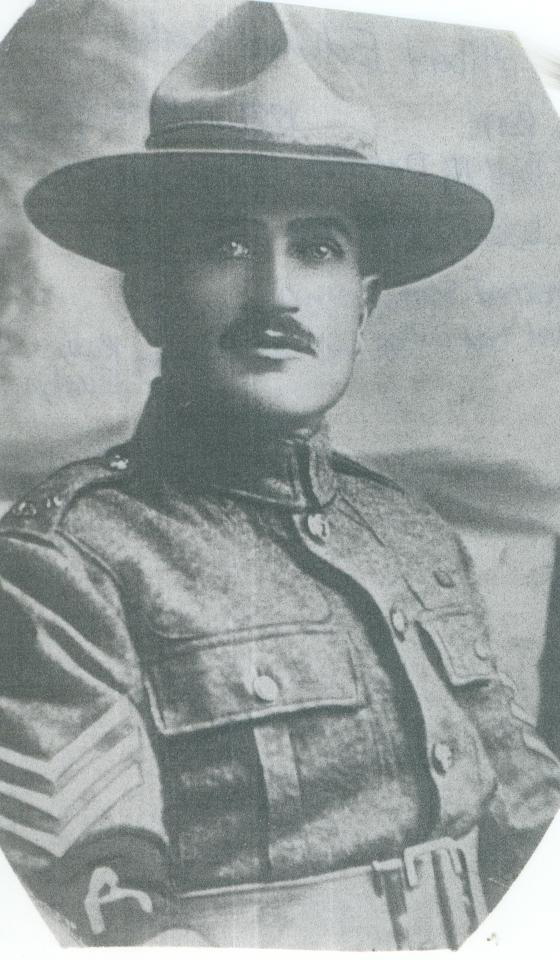Sjt
Albert Edward Lake
Informationen zu Geburt
|
Geburtsdatum: 13/03/1881 |
|
Geburtsort: Te Puke, Bay of Plenty, New Zealand |
Allgemeine Informationen
|
Beruf: Baumeister |
Informationen zum Armeedienst
|
Land: New Zealand |
|
Truppe: New Zealand Expeditionary Force |
|
Rang: Serjeant |
|
Dienstnummer: 33135 |
|
Einberufung datum: 22/08/1916 |
|
Einberufung ort: Trentham, Wellington, New Zealand |
|
Einheiten: — Canterbury Regiment, 1st Bn. (Letzte bekannte Einheit) |
Informationen zu Tod
|
Sterbedatum: 24/12/1917 |
|
Sterbeort: Jubilee Croft, Beselare, Belgien |
|
Todesursache: Im Kampf gefallen |
|
Alter: 36 |
Begräbnisplatz
|
Buttes New British Cemetery, Polygon Wood Grabstelle: XXI Reihe: C Grab: 7 |
Auszeichnungen und Orden 2
|
British War Medal Medaille |
|
Victory Medal Medaille |
Punkte von Interesse 3
| #1 | Geburtsort | ||
| #2 | Einberufung ort | ||
| #3 | Ort des Todes (ungefähr) |
Meine Geschichte
Serjeant Albert Edward Lake was born on 13th of March 1881 in Te Puke, Bay of Plenty (New Zealand). He was married to Sarah Ann Bernard, which whom he had one daughter called Ruby Evelyn. Before he enlisted in the army, he worked as a master builder. When he enlisted on 22nd August 1916 he joined the 1st Battalion Canterbury Regiment, New Zealand Division.
After the Third Battle of Ypres, the New Zealand Division was stationed in the line in and around the Polygon Wood area. In the beginning of December, an attempt was made to capture the Polderhoek Chateau to improve their positions and take the high points of the area from the enemy. They made some small gains, but suffered very heavy casualties. They were able (during the attack) to move the line slightly forward and to avoid further losses it was decided that they would hold and consolidate that new front line.
On the night of 22nd/23rd December the 1st Bn. Canterbury Regiment relieved the 3rd Bn. Canterbury Regiment, where they were in close support to the frontline. Serjeant Lake was killed in action on the 24th December while holding the line. He was originally buried near Jubilee Croft (J.11.a.40.80). After the war he was reburied at Buttes New British Cemetery.
After the Third Battle of Ypres, the New Zealand Division was stationed in the line in and around the Polygon Wood area. In the beginning of December, an attempt was made to capture the Polderhoek Chateau to improve their positions and take the high points of the area from the enemy. They made some small gains, but suffered very heavy casualties. They were able (during the attack) to move the line slightly forward and to avoid further losses it was decided that they would hold and consolidate that new front line.
On the night of 22nd/23rd December the 1st Bn. Canterbury Regiment relieved the 3rd Bn. Canterbury Regiment, where they were in close support to the frontline. Serjeant Lake was killed in action on the 24th December while holding the line. He was originally buried near Jubilee Croft (J.11.a.40.80). After the war he was reburied at Buttes New British Cemetery.
Quellen 3
|
Capt. Ferguson, D., The History of the Canterbury Regiment, N.Z.E.F. 1914-1919, (Auckland, Whitcombe and Tombs Limited, 1921), 220-222 & 300. Verwendete Quellen |
|
Military Personnel File https://www.archway.archives.govt.nz/FullItem.do Verwendete Quellen |
|
Trench Maps https://maps.nls.uk/view/101464909 Verwendete Quellen |
Weitere Informationen 5
|
Commonwealth War Graves Commission Database https://www.cwgc.org/find-records/find-war-dead/casualty-details/480326 |
|
Namenlijst (In Flanders Fields Museum) https://namenlijst.org/publicsearch/#/person/_id=2fa84468-0361-412f-b9be-260f1263f160 |
|
Lives of the First World War (Imperial War Museum) https://livesofthefirstworldwar.iwm.org.uk/lifestory/7177876 |
|
Online Cenotaph (Auckland Museum) https://www.aucklandmuseum.com/war-memorial/online-cenotaph/record/c8468 |
|
The NZEF Project (UNSW Canberra) https://nzef.adfa.edu.au/showPerson?pid=142371 |
